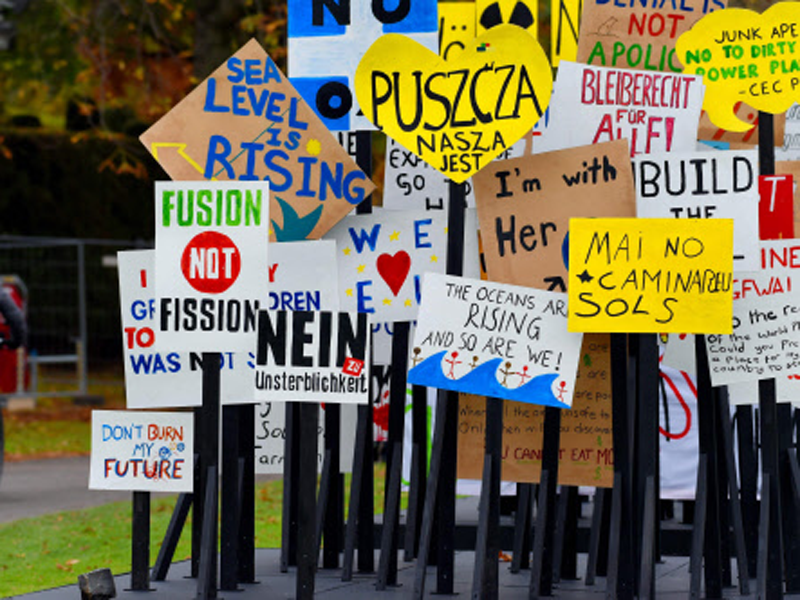Kathmandu, 22 Nov (Prerna Bomzan and Meena Raman) – The meeting of UNFCCC’s Ad Hoc Working Group on the Paris Agreement (APA) eventually closed after 1 am, early morning of 18 Nov, with the adoption of conclusions to advance the Paris Agreement Work Programme (PAWP), overshooting its scheduled closing by three days, in Bonn, Germany.The delay in adopting the conclusions and in resuming the closing plenary of the APA (which began on 15 Nov. but was adjourned), was due to finding a resolution on the issue of addressing the modalities for the ex-ante information on public financial resources to be provided to developing countries referred to in Article 9.5 of the Paris Agreement (PA).
The need to address this issue was taken up by South Africa on behalf the African Group, and was supported by other developing countries but was strongly resisted by developed countries. Following informal consultations by the COP 23 Presidency, a resolution on the matter was found, which made possible for the APA closing plenary to resume and for conclusions to be adopted on the way forward in advancing the work on the implementation of the PA.
In the conclusions that were adopted by Parties, “the APA noted the progress made at this session as reflected in the annexe to the conclusions.”
The annexe contains the “informal notes prepared under their own responsibility by the co-facilitators” of the six agenda items (items 3-8) under the remit of the APA and is about 266 pages. The six agenda items are viz. nationally determined contributions (NDCs), adaptation communications, transparency of action and support, global stocktake, committee to facilitate compliance and matters related to the implementation of the PA.
The APA also noted, “that substantive progress in the deliberations under agenda items 3–8 needs to be accelerated to ensure all issues achieve a sufficient degree of maturity and detail to allow for the timely completion of the work by December 2018.”
The APA also “reiterated its recognition of the need to progress on all items in a coherent and balanced manner, and to ensure a coordinated approach to the consideration of matters relating to the Paris Agreement work programme (PAWP) by the Subsidiary Body for Implementation (SBI), the Subsidiary Body for Scientific and Technological Advice (SBSTA) and the COP.”
“To that end, the APA recommended that the President of the COP consider options for bringing together, under his own responsibility and without prejudice to the future work of the subsidiary bodies, the outcomes of the work of the APA, the SBI, the SBSTA and the COP on PAWP-related matters at this session.”
(In the decision adopted by the COP after the APA closing plenary (decision 1/CP.23), Parties “requested the Secretariat to develop an online platform to provide an overview of the work programme of the PA being carried out in the various subsidiary and constituted bodies, including the APA. See further details in TWN Update 17.)
The APA also “noted the intention of its Co-Chairs to issue, by early April 2018, a reflections note with an overview of the outcomes of this session and to suggest options for the way forward on the basis of the views and ideas that Parties put forward at this session and in their submissions for the session, including as these have been reflected in the informal notes prepared at this session. The note will aim to advance the work of the APA without prejudging any options or proposals Parties may put forward in the future.”
In recalling the APA’s general call for submissions by Parties, the APA “noted that focused textual proposals would be most helpful in allowing Parties to focus on substance in their deliberations on the APA agenda items.”
The APA also expressed its view “that additional negotiating time in 2018 may be useful, depending on the progress being made and the feasibility of convening an additional session in a cost-effective manner while also allowing effective participation of experts from developing countries.”
APA contact group
On 14 Nov, the APA met as the final contact group to hear brief final reports on each of the six agenda items by the respective co-facilitators as well as to consider the draft conclusions prepared by the Co-chairs, which would then be put forward for its’ adoption at the closing plenary, scheduled next day on 15 Nov.
APA Co-chair, Sara Bashaan (Saudi Arabia) took Parties through the proposed draft conclusions and opened the floor for comments and statements by Parties.
South Africa on behalf of the African Group stated that it was important to capture the points reflected in agenda item 8 (on matters related to the implementation of the PA), in the draft conclusions. It said that page 3 of the informal note on this agenda item contained three options as a way forward on the matter of Article 9.5 (on the issue of modalities for the ex-ante information on public financial resources to be provided to developing countries).
It reiterated that this issue was very important for the African Group and a number of developing countries.
South Africa further informed about a submission by the African Group in this regard which was contained in a conference room paper (CRP) which highlighted that the operationalization of Article 9.5 of the PA is an important element of the comprehensive outcome of the work of the APA.
The European Union (EU), Australia on behalf of the Umbrella Group and the United States (US) did not support the proposal by South Africa.
China echoed the concerns made by South Africa and said that a proper way could be found to address the concerns in the conclusions.
The other key issue of divergence was whether the informal notes should be annexed to the APA conclusions.
Brazil, Ethiopia (for the Least Developed Countries), Iran (for the Like-minded Developing Countries), Maldives (for the Alliance of Small Island States), along with the EU, Switzerland, and Norway supported the informal notes to be annexed to the conclusions while Australia and the US did not see the need to annex the notes to the conclusions.
The other issues in the draft conclusions which were debated upon, were the need for an additional call for submissions, the need for streamlining the informal notes by the Secretariat and the need for an additional negotiating session.
Iran on behalf of the LMDC, India and China did not want the Secretariat to streamline the informal notes.
China was of the view of keeping the compilation of the existing informal notes as an annexe and for Parties to digest the document, adding that “some Parties have concerns that their options and views will be eliminated and merged in the streamlined proposal.” Putting the informal notes together will be “pragmatic as the way forward to digest” the document, it added further.
Co-chair Tyndall (New Zealand) in response to the feedback from Parties said that the informal notes would be annexed to the conclusions. In relation to further submissions by Parties, she proposed that the APA note that “focused textual proposals would be most helpful in allowing Parties to focus on substance in their deliberations” and also proposed the deletion of any streamlining of the informal notes by the secretariat.
In response to the proposal by African Group on the Article 9.5 issue, Tyndall said that there was no consensus by Parties on the matter but the Co-chairs “do recognize that proposal is of high importance to the Group and the support from Parties was also expressed”. She said that report on the APA outcomes would be included in the report to the COP.
South Africa in response wanted to “reflect collectively” on the matter and “come back to you”. It insisted that the African Group’s concerns were not addressed by the Co-chairs.
Tyndall concluded that a revised draft of the conclusions would be done and adjourned the meeting, announcing the scheduled closing plenary would take place next day on 15 Nov.
APA closing plenary on 15 Nov
On 15 Nov, the APA met at the scheduled closing plenary to consider the revised draft conclusions for adoption, presented by the Co-chairs.
Sara Bashaan (Saudi Arabia) informed that there was no consensus on the proposal by the African Group on the Article 9.5 issue, and that given the “high importance and support from other Parties” and the Co-chairs intended to refer to this issue in their oral report to the COP on the outcome of the APA, including in their written report.
South Africa on behalf of the African Group stated that they had consulted with the COP Presidency who pledged to consult with all groups on the matter in this regard and therefore, requested an adjournment of the closing plenary until the outcome of the consultations with the Presidency was concluded.
Bashaan reiterated the Co-chairs’ understanding of the importance of the issue to the African Group and on the information provided about their consultation with the Presidency on the matter. The Co-chairs’ suggestion was to reflect the issue in their oral and written reports and that the closing plenary could not be postponed.
South Africa took the floor again, underlining the fact that the adoption of the conclusions is a matter that required consensus by all Parties and that at this stage, there was no consensus on the matter. It said it trusted the COP Presidency and its process and requested to await the outcome of the consultations of the Presidency with all Parties on the issue.
Bashaan responded that “we note your reservation” and “noting your difficulty to engage in the process”, request to allow opportunities for other Parties to express their views. She further reiterated that there was no agreement in the room and that other Parties must be allowed to give their perspective on the draft conclusions and to work out the way forward.
Australia on behalf of the Umbrella Group said it did not support the proposal by South Africa and supported the proposal by Co-chair Bashaan on the way forward.
Bashaan responded by opening the floor for general comments and views.
South Africa took the floor again, stating its understanding of the process. It said that the nature of its intervention was to adjourn and that, “engaging on the substantive is not consistent with the rules of procedure”.
Ecuador on behalf of the G77 and China said that adoption of conclusions need to reflect a consensus by all Parties. It further said that the issue was a request by a group of countries from the G77 and it was an issue of all developing countries, adding that the attention is given to the issue.
Iran for the LMDC supported the proposal by South Africa and requested an adjournment to allow for consultations “in a very expeditious manner”.
The EU while respecting the African Group and the trust it had in the COP Presidency, requested the Co-chairs not to adjourn the meeting. Japan also said echoed the views of the EU.
Bashaan then responded that the Co-chairs would like to propose to suspend the meeting for 20 minutes and come back with the way forward.
Following the suspension which took more than the allotted time, Bashaan informed Parties that the Co-chairs were still working for a possible solution, proposing to suspend the meeting and come back later in the afternoon. She said, “colleagues will benefit by suspending this meeting now” and thus, suspended the meeting, announcing that the venue and time of the resumed session were yet to be decided.
The APA closing plenary only resumed on Saturday, 18 Nov after informal consultations on the Article 9.5 issue found resolution. (Further details on this will be provided in a separate article.) – Third World Network




